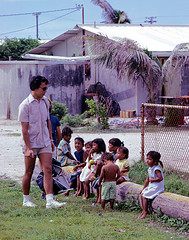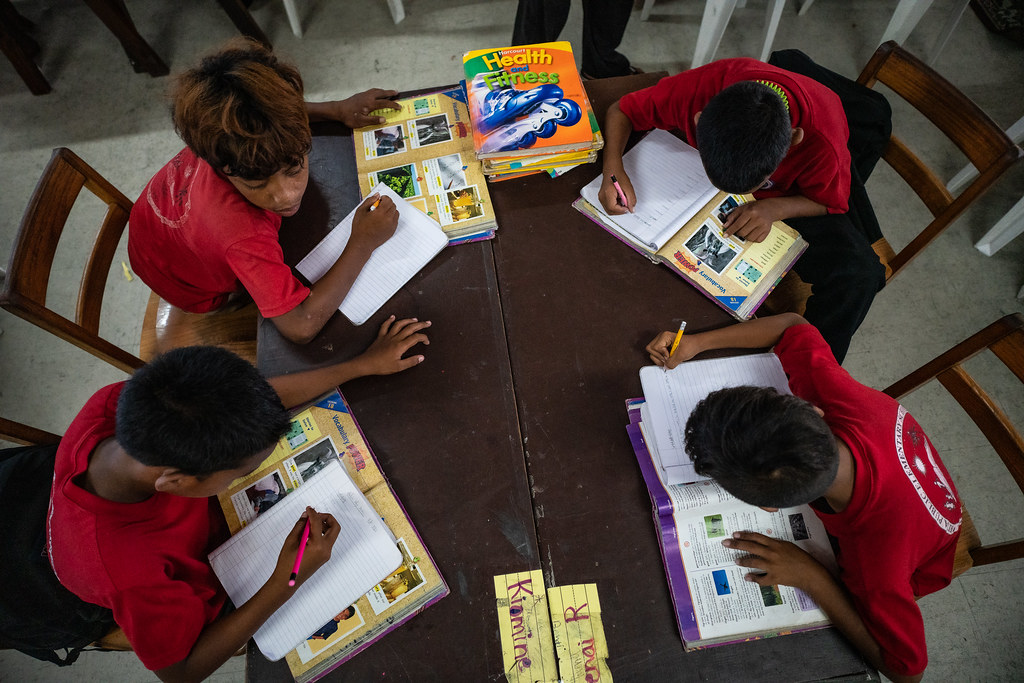
National Training Council – Marshall Islands
FollowOverview
-
Sectors Transport
-
Posted Jobs 0
-
Viewed 76
Company Description
National Training Council – Marshall Islands
RMI Education and Skills Strengthening Project
The Government of the Republic of Marshall Islands has actually received funding from the World Bank for the Education and Skills Strengthening Project (ESSP) expense. It intends to apply part of the proceeds for speaking with services.
The consulting services (“the Services”) will help the Project Manager and the RMI National Training Council in executing the World Bank-funded project efficiently.
The task will concentrate on supporting the Project Implementation Unit (PIU) in producing a structure for Recognition of Prior Learning (RPL) for TVET, targeted at assisting the College of the Marshall Islands and the RMI National Training Council evaluate and improve the skills of employees through recognized college certification.
The in-depth Terms of Reference (TOR) for the project are indicated in the connected Terms of Reference (ToR).
The National Training Council now welcomes eligible people (“Consultants”) to indicate their interest in offering the Services. Intrigued Consultants must supply information showing that they have actually the needed certifications and pertinent experience to perform the Services (attach a Cover Letter of no greater than 4 (4) pages attending to the obligatory experience and certification requirements curriculum vitae with a description of experience in similar tasks, similar conditions, etc). Companies’ staff might express interest through the employing firm for the project. In such a situation, only the experience and certifications of people will be thought about in the choice procedure. The requirements for electing the Consultant are: A.
Mandatory Qualifications and Experience Master’s degree in education, training
, management, or a related field. Minimum of 5-10 years of experience working in TVET System. Curriculum Design and Systems.
Have 2-5 years’ experience developing and
carrying out RPL. frameworks, policies, and procedures. A sample of previous work will be required as evidence of previous experience. Outstanding interaction, training, and assistance
skills. Experience with working with varied stakeholders, consisting of federal government. agencies, TVET organizations, companies, and students in the Pacific. B. Desired Qualifications and Experience Capability to deal sensitively in a multicultural
environment and construct efficient group relationships with customers and pertinent stakeholders. The attention of interested Consultants (including companies )is drawn to paragraphs 3.14, 3.16 and 3.17 of the World Bank’s”

Procurement Regulations for IPF Borrowers “July 2016 modified November 2020” Procurement Regulations “, stating the World Bank’s policy on dispute of interest. Additional info can be obtained at the address listed below throughout workplace hours, 0900 to 1700 local time. Expressions of interest need to be
delivered in a written form to the address listed below (in person or by e-mail )by 5:00 pm, 23rd December 2024.
The subject line ought to state:”National Training Council Strategic Plan Consultant -complete name of the prospect”. Julius Lucky Director National Training Council!.?.!ntcdr@ntcinfo.org:Phone: 692 625-4521 Empowering Community Champions for Sustainable Development in RMI Gender Equality, Climate Resilience and Water Safety Training Majuro,
Republic of the Marshall Islands: The fourth
Women and Youth Training for
Gender Equality, Climate Change, Disaster Risk Reduction and Water Safety Management has actually recently taken place at the University of the South Pacific’s campus in Majuro, the Republic of the Marshall Islands(RMI ). This vital training was organized by the United Nations Development Programme( UNDP )Pacific Office through the Addressing Climate Vulnerability in the Water Sector(ACWA) job. The week-long capacity-building training intended to empower women and youth with the knowledge and practices required for climate-resilient water security management in the
Republic of the Marshall Islands(RMI ). This training reinforces a commitment to boosting RMI’s water security and community strength versus environment change effects, especially women

and youth, ensuring that nobody is left behind. The training invited individuals from all 24 atolls and included resource speakers from government agencies, non-governmental organizations, and global advancement partners from the RMI Environmental Protection Authority, Climate Change Directorate, Office of the Chief Secretary, Ministry of Culture and Internal Affairs, National Disaster Management Office, Women United Together Marshall Islands, RMI Human Trafficking Task Force, Waan Aelõñ in Majel, Jo-Jikum, and the International Organization for Migration. In her opening remarks, Secretary for the Ministry of Culture and Internal Affairs, Brenda Alik, underscored the significance of collective action in building a climate-resilient country.”It is our duty to come together and collaborate. As we deal with the obstacles posed by environment modification, understanding its impact on our water resources is vital for improving the wellness of communities throughout the Marshall Islands,”she stated.
rmi national training council Environmental Protection Authority General Manager Moriana Philip highlighted in her speech the vital function of females and youth in resolving climate-related challenges.”This workshop joins us from different neighborhoods to deal with the pressing concerns we face today, consisting of climate-related obstacles, particularly on our water resources.”We wish to highlight the vital function of women and youth in this task as your involvement contributes to its success and beyond, “she said.
The very first day of the workshop covered critical concerns associated with gender equality, human rights, and public health within the Marshall Islands. It consisted of discussions on gender equality and mainstreaming, concentrating on the effects of climate modification on water security and the disproportionate impacts on susceptible groups. The significance of integrating gender equality and social inclusion into all job elements was also talked about. Human rights and human trafficking were tackled, stressing the need for thorough security of susceptible populations
during emergencies. In addition, the workshop dealt with gender-based violence, highlighting the various forms that can develop in disaster situations, such as domestic violence and sexual coercion. The program concluded with a focus on sanitation and health and their essential role in health, incomes, school attendance, self-respect, and building durable neighborhoods. ACWA Project Manager Koji Kumamaru revealed his thankfulness to all individuals
, emphasizing the value of their contributions to their neighborhoods.”Women and youth are crucial to the success of the ACWA project. More importantly, you are the champions and future leaders who will return to your neighborhoods to empower others,”he stated. During the workshop, individuals went to Rongrong Island and examined the 15,000-gallon Flatpack Modular water tank installed at the Rongrong High School Boys Dormitory as part of the ACWA project. The setup is a crucial element of the task, complemented by assistance from Australia
‘s Department of Foreign Affairs and Trade. The see acted as an important direct experience of the positive impact of the ACWA task on the neighborhood and its

water resources. Marie Naisher from Jabat Island expressed her thankfulness for the chance to join the workshop and made clear her desire to be part of the task when it reaches Jabat.
“This was my very first time participating in such training, and I learned so much from the guest speakers, group activities, and the website visit. I now comprehend the importance of tidy water and how to sterilize it. I’m ecstatic about the ACWA task concerning Jabat and all set to assist when it gets here,”she stated. Don Kobney, an ACWA site organizer from Santo, Kwajalein, also shared his excitement.”The workshop and site visit improved my self-confidence and understanding of the water tank setup.
Seeing the 15,000-gallon flatpack modular water tank firsthand provided me a clear understanding of the system, and I’m looking forward to sharing this understanding with my neighborhood, “he stated. By the workshop’s end, individuals were better equipped to comprehend environment modification and its local impacts, drive adaptation and mitigation efforts, especially in water security, and use brand-new resources to affect their neighborhoods positively. ACWA is enabled thanks to the support of the Green Climate
Fund, with the project co-financed by the Government of the Republic of the Marshall Islands
. The Marshall Islands: Skills Training and Vocational Education Project Evaluates the efficiency of the project and highlights lessons. Provides inputs to two wider examinations- the regional assessment of ADB assistance for the Pacific and the unique examination study on Millennium Development Goals. The low academic achievement and scarcity of Marshallese skilled workers were mostly due to the low quality of standard education, lack of access to education in the external islands, and weaknesses in skills training and the employment and technical education system.
These supported an economy marked by high unemployment because of constrained private sector growth and government downsizing. Joblessness was particularly high amongst the youth and ladies in the external islands. Appropriate local proficient personnel for existing job vacancies
were unavailable, hence the importation of appropriately proficient foreign employees. Therefore, there was an inequality between offered tasks and abilities of the Marshallese labour force. These conditions supplied the initiative for the Government
of the Marshall Islands to prioritize technical and trade education training reforms. In 2000, ADB approved a loan for $9.1 million to improve abilities training to offer well-trained employees required for continual economic and social advancement. This was to be achieved through an integrated national skills training system. The job included 4 parts: development of a profession awareness program, abilities training improvement, improved abilities training opportunities for women and youth, and institutional strengthening. The anticipated outcome was increased income-generating chances and work for students, specifically females and youth in the external islands. In general, the task was ranked unsuccessful. Minimal progress was attained in making the task responsive to the requirements of its recipients and private-sector employers. The long-standing weak point of poor numeracy and literacy competencies
amongst public primary and secondary school graduates and dropouts going into college or participating in voc-tech education could be partly credited to the poor quality of basic education. The job was supply-driven and could not develop a strong linkage with economic sector requirements or align its activities with the requirements of the labour market. The status of the technical and professional education training system has actually remained fundamentally the exact same after task completion. The study put forward that ADB might motivate the Government of the Marshall Islands, through consultation and policy dialogue, to follow through on the federal government’s
dedication to establishing a committed labour details system to connect technical and employment education training program offerings with market need. Although the task established a labour market info system, in the lack of in-house personnel ability at the National Training Council, it was not completely functional.


